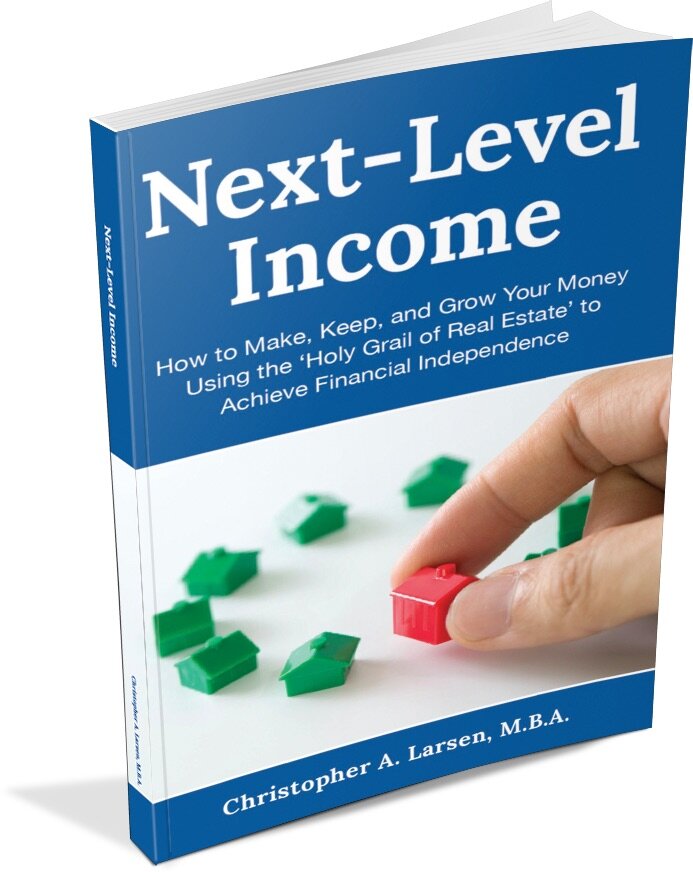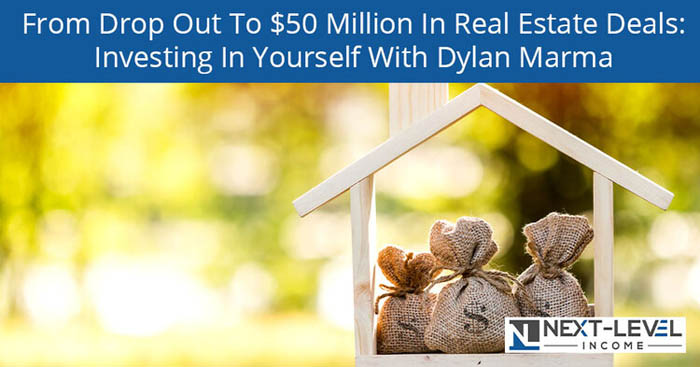Subscribe to The Next-Level Income Show
Watch The Episode Here:
Listen To The Podcast Here:
FROM DROP OUT TO $50 MILLION IN REAL ESTATE DEALS: INVESTING IN YOURSELF WITH DYLAN MARMA
We have Dylan Marma. He is a Principal of The Requity Group, a multifamily real estate company. He has a few years of real estate experience, participating in $50 million in real estate deals as a general partner or joint venture. He has worn many hats in the business including acquisitions, investor relations, asset management, and business development. With a passion for scaling businesses and helping facilitate great deals, he Cofounded Equity Tree in 2020 to provide a platform backed by software solutions for investors to become better operators. Dylan, welcome to the show.
Thanks. I’m excited to be here.
For the audience that doesn’t know your background, give us a little more detail on how you ended up where you are.
I didn’t go out and buy $50 million in real estate all on my own. It’s something I’ve to take a step back to when I got started in real estate investing. At 21 years old, I bought my first single-family property. I took a leap of faith moving from New York, buying the one-way ticket out to California with the goal of creating a lifestyle by design. I started reaching out to people and throwing the intention out there that I wanted to get involved with real estate in some form or fashion and ended up getting a job working for a real estate investment and education company.
There, I was surrounded by a lot of good mentors that opened up my eyes to the different facets of real estate investing, and like many, I started off with a single-family property. From there, I bought a duplex and as I continued to learn, I realized that if I were to work W-2 and continue to buy one property at a time, there was something about that path that for me didn’t quite align with my own value system in a sense. It was too certain of a path and it almost bored me to think about, “If everything goes right, where I would be in ten years following that road?” I sought out to find a way to scale and to get into bigger investments and to entertain the entrepreneurial part of me. Multifamily syndication was the answer to that.
I was able to invest in myself heavily into education, into mentors and learn the space inside and out. After enough of that, I eventually felt confident enough to leave my W-2 when I didn’t have all that much experience, but I had the cash and, and I was working 70 hours a week. I found it difficult to make the progress that I needed to because it was on the other side of the country from the deals that I was looking at. I said, “I have some cash saved up. I’ll be able to free up my time.” I moved out to Atlanta a few years back with the intention of getting multifamily. I bought a 21-unit that was a joint venture with a few partners.
From there, I got into syndication, which is the art of finding big deals and pulling together investor capital to purchase those deals. It’s providing them with great returns that are truly the most passive form of real estate investing and allowing us as the operators to put in the sweat equity in exchange for a small share of the profits on the other end of it. Starting off with the syndication space, start off with 132 units with a few partners and one deal led to the next. We’ve done about 750 doors, about 500 of that being syndicated and 250 being joint ventured. I started a brand as I split off from a former partnership. Going through that, and as I continue to grow, I’m looking at multifamily and also mobile home parks.
We both got our start around age 21. I love having people like you on the show. You’re such an inspiration. In a short period of time. I talk to people and say, “If you have a plan, anybody can achieve financial independence in seven years with the right plan.” You’re living proof here by the age of 26 that you’ve come out of the doors and done it. I love your two goals to create a world-class real estate investment company and to reform modern-day education. That aligns closely with Next-Level Income, which we talk about helping investors in chief financial independence through education and opportunities. Can you please share with the audience how you came to those guiding principles and how that works in your day to day experiences?
Number one, creating a world-class organization is something that gets me excited more than anything. I find I’m a system builder. If I could define myself and what I gravitate towards, it’s building stuff. When I think about creating an organization, I think about building the infrastructure that the organization operates off. One of my biggest virtual mentors is Ray Dalio. He talks a lot about creating an idea of meritocracy and his book Principles is basically the blueprint on how to build a winning culture within an organization. For me, in the long-term, I would love to build a company that operates like a real estate, private equity company where I have great people around me that are extremely smart and challenge each other’s ideas and create that idea meritocracy and environment. That’s the type of culture and world that I’d like to live in.

Investing In Yourself: You have to have a certain level of pain or risk tolerance to make decisions and hopefully end up on the other side successfully.
I would love to be a part of building the infrastructure that makes it all tick and makes it all work. Goal number two, pertaining to reforming modern-day education. When you look at a lot of nowadays problems in our society, a lot of it stems from the bottom, which is education. The incentives are not aligned when you look at nowadays authorities and political leaders because they’re focused on getting the maximum results out of four years. Investing back into education is not something that is going to reap the rewards over a four-year time period. It’s something that takes many decades to see come to fruition. It’s going to take external forces from people that are sharing the mission to reform modern education and reinvesting resources into modern-day education.
That can be through the format of investing funds back into schooling systems, getting teachers paid more, that could be getting resources in the schooling systems, that could also be through alternative ways of schooling and changing. Their current system for teaching is outdated and needs reform when it comes to financial education or thinking like an entrepreneur or you’re prepping people as we continue on the information age. Doing that in some capacity would be something that motivates me. My mom was a teacher. I have several teachers in my family, that’s why it’s close to home.
My mom was a teacher as well. Had a lot of frustrations with the education system when I was younger. We’re launching a new venture in Asheville with another nonprofit to help teach financial literacy to those that don’t have good backgrounds in that. I think that higher education is heading down the same path that housing was if you look back several years. We’ve 6% to 10% increases in the cost of education over the past decades. You’re several years or so behind me what costs me $25,000 for a four-year education is now costing students $25,000 per year.
The estimated cost for a four-year education for my children in the next many years is going to be $200,000. I’m looking at this and thinking, first off, how much do I need to save to give each of my children $200,000? Two, is it even worth the money? If I can take that $200,000 and invest it, is it going to achieve a payoff? What do you think about that? We’re talking a broad scope, but as far as higher education, what are your thoughts?
I’m a college dropout. I was doing that math two years into school and ended up leaving because I was taking on an enormous amount of student debt and I could connect the dots. I was going to school for accounting and looking at the average salary and thinking about how much time it’s going to take for me to be able to pay that back. I got this entrepreneurial kick. It was a combination of the entrepreneurial kick, a little bit of naivety, admittedly, and doing the math in terms of the ROI and logical standpoint that pushed me at that time to leave school.
I don’t fully regret it. Although, I will admit that I think I’m an exception in a lot of ways is I had the ambition, the drive to do what it takes to make it without school. I do think that the way our current society set up a lot of entry-level jobs do require you to have that degree and it makes it difficult, especially if you do not say extrovert. There are more opportunities for extroverts. I’m not always super extroverted, but I’m willing to work with people that are more introverted and need technical skills, schools, the most viable path because that’s going to get you into some space, I can lead the next things. The ROI is going to be continuously harder to justify. It’s important that people know why they’re doing it.
At 18 years old, how many of us knew what we wanted to do long-term? We jumped into it and you have all of your family around you pushing you to get the piece of paper. They know it doesn’t matter what you’re getting it for. It’s a matter of getting it so that you can have it and go and get your first job. As we see, jobs are going to become scarcer and more specified to technical, specialized education. It has to change. There’s always going to be value in investing in education, but I imagine that you’re going to have a much more specialized platform to learn a specific skillset, be it learning how to code, learning a trade, or something to that effect is going to become more important.
I had a discussion many years ago with a younger gentleman. We were talking about the inequities of education and how everybody deserves an education. I held up my cell phone and said, “Everybody’s gotten it. You can have an education. What are you talking about?” I held my cell phone and says, “Right here in your hand.” It calls me to think a lot. It’s like, “How am I going to teach my children this?”
What we decided upon my wife and I was one, we’re going to give our children the resources to go to school. Two, we’re going to teach them how to calculate the ROI. Three, they need to understand the opportunity costs. If they can have those three components and they still decide that’s the best choice, then I’m going to feel good about that, but we want them to have skin in the game too. Do you have any active initiatives that you’re doing to change education actively?

Investing In Yourself: What’s going to change the quality of your life is the investment that you make back into yourself.
Not really, but the most I do in terms of helping other people is in the world of real estate. I do a lot of mentoring and working with other people in helping some younger people get into the space as I can. My view is almost a little bit of my idealistic long-term view as far as the area that I’d like to make an impact in. Most of my time is consumed with real estate investing. Hopefully, I’ll find a way to tie that in on the next decade.
A college dropout, 750 units, age 26, it sounds like a dream. Tell me about some challenges that you faced along the way for the audience that says, “This is too good to be true.”
It’s psychologically totaling to go through and take some of the risks that I’ve taken in the last many years. You have to have a certain level of pain or risk tolerance to make these decisions and hopefully end up on the other side successfully. I can go back to the beginning, leaving school, a lot of pushback, a lot of adversity. I was president of a fraternity. I had a lot of friends, great people around me that wanted me to stay in. I had a loving family that wanted me to stay in. They thought it was best for me, there’s a lot of push back there. That was a tough time to push through against the degree in that sense.
From that time, I’m eventually leaving the W-2 job. Leaving a security blanket that was making a good income. I was in a leadership role and doing well there, but I knew that for me, it was not the path that I wanted to follow long-term. At a young age, I realized that I wanted to take risks to get into something entrepreneurial that I had the ability too. I remember walking around every single day when I first got to Atlanta, getting myself affirmations that I’m going to make it. I’m going to be an owner of 500 units, I’m going to find this next big deal.
I felt like as soon as I got out there, it was one of the hottest markets we’d ever faced. I was second-guessing myself constantly, “Are there still deals out here? Is it still possible? Is it going to work?” That took a lot of this resilience to continue to convince myself that I was making the right decision. One path, but it took over a year of searching before the momentum started. Even from there, you have the trials of not every deal is perfect. I know on podcasts everyone likes to talk about the fairytale deals that they do, but all kinds of challenges happen. Your occupancy decreases, you have all kinds of tenant issues. You have things that you don’t dig up doing due diligence, you miss and you have to learn from that later. It’s a rollercoaster in a sense and consuming of my time and mental energy in terms of the amount of input I’ve given towards real estate to get here.
It is a marathon. They get started and they stumble. They don’t get through that first year that you got through. The same thing it took my partner and I. We started our partnership in 2015. We syndicated our first deal in August of 2016. It was about a year that it went down there and you feel like you’re literally banging your head against the wall as you do that. You talked about investing in your education. Can you talk about the importance of that component to get you to that first big success?
I’m a big believer in investing in education, be it in the form of mentorship, be it in the form of online courses. I’m also an avid reader. Time, energy, money investing everything early into education. Especially, when you’re younger and that doesn’t have to be age, that can be in your career. If you have only $50,000 to your name, you should not be focused on spending $50,000 on a single-family rental property because that $300 a month is not going to save your life or make life that much better. What’s going to change the quality of your life is the investment that you make back into yourself to figure out how you can increase your income or create a business.
Whatever that be, it stems down to finding a way to, first make sufficient enough income, be it through a business or advancing further in your career. The best way to do that is to invest in education. I started off with a leadership coach from the John C. Maxwell organization. That was super helpful for me growing in my career to get to a management position. Along the way, I invested in public speaking training, I did Toastmasters, constantly reading and then when I got into multifamily, I invested into a mentor. We’re close with Vinney Chopra. I didn’t even know if he was doing a lot of mentorship at that time because he wasn’t as widely open, but I said, “I’d love to learn from you. Let’s do something together.”
I invested in his mentorship. I had to spend $6,500 to visit Grant Cardone because I was a fan of him, his mindset and his outlook on investing. I said, “Considering making this decision to go all-in on multifamily. Is it worth my time?” I sat down with him and I sat down with one other guy who was a mentor to me, also another guy who was worth $100 million at that time. I had to hear it from people that were further down the road than I was to make me realize that I wasn’t crazy to take this leap and to invest all my time into the vehicle. After the conversation with them and with the others that I had, I was able to say, “Let’s go all in. Let’s not hold back.”

Investing In Yourself: Real Estate is a broad field, there are hundreds of different ways you can make a career out of it and many of them are lucrative. There’s no wrong answer.
I still listen to Grant when I needed to get fired up a little bit. I went to his event and it’s amazing what he’s built. He’s a little ra-ra for me. I’ll fire up one of his books. You got a couple of different businesses, tell the audience about Equity Tree, how that came to be and what it is?
Equity Tree is a software platform that essentially is an investor management system or investor management portal. For those that are in the business, you’re probably familiar with what those are. It’s a portal where principals or sponsorship groups like what Next-Level has and what I have. We will invest into software that then gives our passive investors almost like an online banking account. It’s similar to when they log into a Vanguard, where they can scroll through. Decide which investments they’d like to place offers on and to view any of their updates on their performance and previous deals. This is something that’s been neat. It’s my first technology venture. It’s been quite a learning experience, but I enjoy especially the product development and the ongoing building out something that is going to serve, a quality purpose for the real estate community.
Ekaterina started the project with the vision of helping her joint venture partners. When I saw what she had been putting together as I’ve known her for several years, I said, “This looks like something that could also be open up doors for different people that are in the syndication world.” I was spending $15,000 a year on software at that time. I said, “We need to create something that’s much more affordable and we can put it in the hands of all these people that are earlier on. We’re getting sick of writing checks that large for this stuff.” That’s what we did. We’ve been live and it’s been off to a great start. We’re helping a lot of people through raises as we speak. I’m using it for myself as well. It’s been a good experience.
With Requity, tell us a little bit about your strategy, and some of your recent deals that you’ve been looking at. How has COVID affected the whole process in 2020?
The big picture strategy is focus on deals that are relatively simple, that have in place cashflow, that have some value-add component and are quality risk-adjusted returns. We’re not swinging for the fences on anything that’s an ultra-high risk. There’s no more meat on the bone, in a sense. We want to thrive off active management. In the form of active asset management, in some cases, active property management in addition to asset management. That’s the big picture as far as what we’re looking for on the deals that we’re targeting, and we’re primarily going to be working with investors, doing deals that are bullet enough to work with a large group of investors.
I’ve been all multifamily. I’m also taking an interest in strong liking and making a lot of action in the mobile home park space. I have a few projects I’m working on and plan to continue to grow and thrive in that space. I thought it was going to be in apartments forever and that was the only thing I would ever touch. As life goes on, experiences come up and we change our views. It’s been almost a year since I’ve done a deal and I never thought that would happen. I was doing a lot of deals each year and then the markets continue to get more heated up. Cap rates have continued to compress.
It’s hard for me to make sense of a lot of the opportunities out there and I will continue to do multifamily and not being a naysayer. I’m sure there have been plenty of good deals out there in 2019. I haven’t been seeing as many that wet my appetite, but when it comes to the mobile home park space, there’s more breathing room as a whole. In the sense of going in cashflows or after the value of the yield on these is high. When people understand how these deals work, I would go to argue that they’re less risky. It’s a deal by deal basis. There are risky ones and they’re risky apartments, but as a whole, if you can get into your bread and butter which long-term is taking a deal, adding value to it, and then eventually having a tenant-owned home and equality complex somewhere in the country at that point, they own the home. There’s over a 95% retention rate.
You’re running a ground lease. You can have a well-managed community and you can have very fitting demographics of either workforce, families or retirees that are going to be happy to live there and pay consistently. I liked the model and I think that it can offer one of the best risk-adjusted returns. I’m working with an experienced partner. It’s important for me especially working with some of my investors is that I have I’ve experienced on my team. My partners have about $50 million on the mobile home side, I’ve done $50 million on the multifamily side. Together, we’re able to bring unique perspectives to the table and that’s what I’ve been very excited about.
My uncle in Colorado and he lives in between Aspen and Glenwood Springs. We were driving to Aspen one day and we’re talking about affordable housing and the crisis in this country. I pointed out the mobile homes. I said, “That’s a solution right there.” You’re right. You look at different areas in different parts of the country and there are a lot of similarities with mobile homes and multifamily. The aspect of the ownership side is something that is different. There are a lot of cool things going on in that space. We need to be creative when it comes to how we’re going to make things affordable for people.

Next-Level Income
It’s similar to the C-class multifamily, the workforce stuff in the sense of the resident base that you’re serving. You’re usually serving different groups that have different appetites. Some value the homeownership aspects of it, but a similar mission in terms of being able to solve a problem. There’s always a little bit of a stigma that scares people off without it. It’s also hard to self-manage these or find a quality third-party manager. That also keeps a barrier to entry. As a whole, the affordability crisis is going to be an ongoing issue. It’s good to be a product of solutions that I think we’re always going to be secure in those pockets.
If you could go back, you’re still in college, you’re twenty years old and you’re thinking, “What do I do here?” Now, you’ve already been through it, what advice would you give yourself back then when you’re making this decision?
It’s difficult to completely put myself back in my old self shoes because I wouldn’t be the person I am without taking the journey that I’ve taken. If I knew that I was going to go on the same path that I’m going on, I would not have spent time going into other spaces and dabbling with single-family or going for mostly a residential company at that time and I would have honed in on the vehicle. That’s where people miss. There’s a lot of uncertainty at first for anyone getting into real estate. It’s, “What vehicle do I take?” Real estate is such a broad field. There are hundreds of different ways you can make a career out of the real estate and many of them are all lucrative.
There’s no wrong answer, but you need to choose one. You might want to dabble for a little bit and figure out what resonates with you. Once I was able to find the vehicle, I was ready to sink my teeth into and stick with, the sooner you can do that, the better. At that time, admittedly I probably would’ve finished up school and been learning massively at the same time. I knew at twenty years old to be tough to go and buy a large apartment building and I would have been focused on my learning and education both in school but also out of school.
I probably would’ve seen what I could do to find a mentor that I could work within the summers and during any downtime to underwrite deals for, to handle the due diligence and find some apprenticeship that would be serving for me. That way by the time I’m 23 or 24, I have ample experience under my belt. I’m ready to launch and do it bigger in the future. I probably would’ve stayed in school looking back if I knew this was my vehicle, I knew this was my plan and then I would have found an apprenticeship.
That’s one of the big pieces of advice we always give out, which is find a mentor, find somebody that’s done what you’ve done that you can model. I know a lot of people are sitting here shaking their heads thinking, “The guy’s young, still he’s done a phenomenal job.”
The school part of why I say that because I’m in such a finance-driven profession. If I was an online marketer, that’d be pointless. There’d be no reason for me to stay in school, but the world I’m in is commercial real estate. I’ve invested in CCIM classes and all these different real estate finance classes. I would have stayed in school to get a lot of the basic finance terminology and understanding down. That’s more specific to the niche that I’m in.
That’s a nice overlay going back to the education side. I’m not anti-education, you’re not anti-education. On the contrary, we’ve talked about how much money we’ve been. I’ve invested tens of thousands of dollars in programs and courses. It’s about being focused on looking for the ROI and what you’re going to do. It’s such a challenge if you’re eighteen, it’s like, “Go to college, get an education, get a job.” What about having an apprenticeship, figuring out what you want to do and deciding like you’ve done to be targeted and focused on getting the dollars back for where you’ve invested those.” I appreciate you sharing all this with the audience. If they say, “I want to learn more about Equity Tree, your platform, or your investing opportunities with Requity.” What’s the best way to get ahold of you?
You can visit the website TheRequityGroup.com. On there, I have a link to Equity Tree, which is EquityTree.io. You can also find me on Facebook or LinkedIn and you can also shoot me an email at Dylan@TheRequityGroup.com. I’m happy to jump on a call and chat with anyone about anything. Don’t be a stranger, definitely feel free to reach out.
Thank you for all the value you’ve provided to our audience and look forward to catching up with you again soon.
Important Links:
About Dylan Marma

Dylan Marma is a principal of The Requity Group, a multifamily real estate company.
Dylan has 5 years of real estate experience, participating in $50M in real estate deals as a general partner or joint venture. He has worn many hats in the business, including acquisitions, investor relations, asset management, and business development.


Subscribe to The Next-Level Income Show